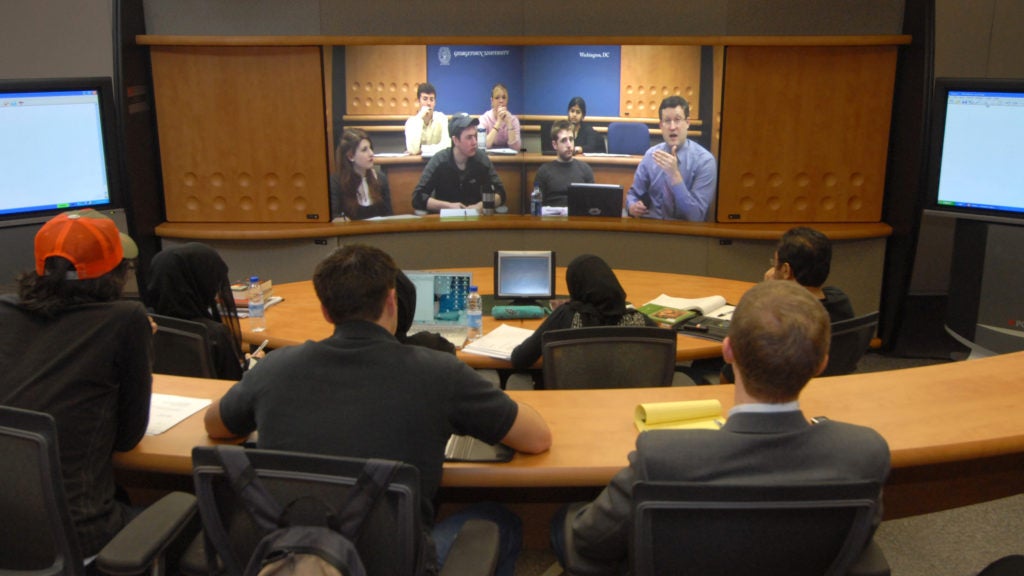Georgetown University Launches Global Classroom

Students in Washington D.C., and Doha, Qatar, Learn Together Using High-Definition Video
The system, which uses Polycom® RealPresence™ Experience High Definition (RPX™HD)technology, will be used to deliver undergraduate courses to and from Washington. Since the system makes the technology more transparent, thus increasing the connection between the students and the professor, there is more natural interaction between students and faculty. The technology allows students in Qatar to take classes from well-known professors in Washington. At the same time, it allows students in Washington to learn from the world-class faculty that are located in Qatar.
Located in the capital city of Doha, the Georgetown University School of Foreign Service in Qatar is the first branch campus of the world-renowned Walsh School of Foreign Service at Georgetown. The program provides a 4-year undergraduate degree in international politics to students from the Middle East and around the world. The Global Classroom initiative, led by James Reardon-Anderson, dean of the School of Foreign Service in Qatar, is designed to help provide a consistent learning experience between the campuses.
“The point of the global classroom is to enable students and teachers in separate locations – in this case Doha and Washington – to experience learning as if they were in the same room,” Reardon-Anderson said. “This gives students from different countries and cultures an opportunity to talk directly to one another, and it weaves together the two Georgetown campuses in ways that have not been possible in the past.”
“Georgetown University’s Global Classroom is a great example of how Polycom telepresence solutions can erase the collaboration barriers caused by distance and create wonderful new opportunities – in this case for the students, faculty and the university,” said Youssef Saleh, vice president and general manager of telepresence and vertical solutions at Polycom. “The flexible nature of this technology makes it ideal for a broad range of industries and interactive applications. We look forward to seeing how the progressive educators at Georgetown will use this system to continue to enhance their curriculum for students of international affairs.”
The system is currently being used in one undergraduate course titled “Causes of War.” David Edelstein teaches the course from Washington, DC, to two groups of students, one in DC and one in Qatar. After overcoming the initial surprise of using the new technology, students from both campuses are now engaging in real-life classroom discussions.
“It is a way of enhancing the experience by providing select opportunities for teachers and students on both sides of the Atlantic to study and learn together,” said Reardon-Anderson.
The University is currently evaluating ways to expand the use of the system for additional courses, as well as student meetings and more. “This truly opens the doors between D.C. and Doha,” says Randy Bass, executive director of the Center for New Designs in Learning and Scholarship. “This is at the center of what we do as a global university. It’s exciting how many possibilities there are for powerful interactions in the future.”
In Qatar, TechnoQ, Polycom’s certified reseller in Qatar, implemented the solution and is providing on-going support. “We are proud that we have been chosen by Georgetown University for the first Polycom Telepresence System in the Middle East” said Zeyad Al Jaidah, Managing Director, TechnoQ. “This has been a terrific opportunity to strengthen our experience in providing AV solutions for major educational institutions. Furthermore, as a Qatari enterprise, we are proud to continuously contribute to the development of Qatar’s knowledge-based economy by providing best-in-class technology solutions.”